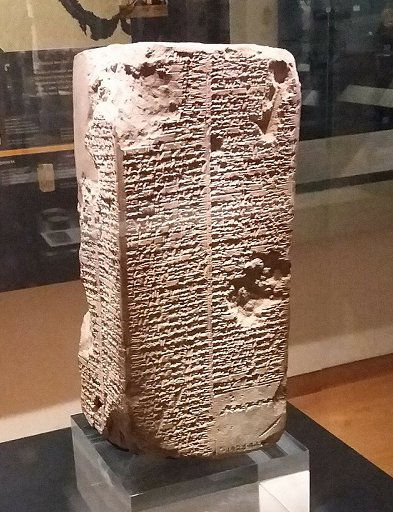Dumuzi & Geshtinanna: Reasons for Seasons
- Sylvia Rose

- Dec 19, 2023
- 5 min read
Updated: Mar 19, 2025
Dumuzi and Geshtinanna are brother and sister deities in Mesopotamia. Dumuzi, a god of shepherds and fertility, is consort of Inanna. Goddess of love and war, she's a sweetheart until her temper explodes. Look what happens to Dumuzi when he gets too conceited.

Next thing he knows, he's dragged down into the Underworld, Kur, to be tortured by evil gallu (galla) demons. He soon regrets his misdeeds.
Inanna (Goddess Queen of Heaven) has just come back from her own foray into the Underworld. She's tricked by her older sister Ereshkigal, killed and hung on a hook for three days.
Fortunately Innana has emergency measures in place. She's resurrected and escapes with her rescuers, pursued by ferocious gallu demons all the way.

When Inanna arrives back home she sees her servants, sukkal, friends and family weep for her and observe the proper mourning rites. Meanwhile her consort, Dumuzi, sits under a tree in glamorous robes, eating fruit from golden plates, attended by servants and entertained by musicians and dancing girls.
Inanna blows up like volcanic Santorini and calls the galla demons, who are trying to grab someone to take back to the Underworld in Inanna's place. Ereshkigal dislikes them returning empty handed.

They seize Dumuzi with cries of glee, tear off his royal robes and drag him screaming into the dark and dismal land of Kur to be tortured for all eternity. Satisfied, Inanna goes off to take a long hot bath.
In another version, Dumuzi flees and escapes the demons. They torture his sister Geshtinanna, but she won't tell them where he's hiding. The demons turn their attemtion to an unnamed friend, who blurts it out.
The galla capture Dumuzid. Inanna's brother Utu (Shamash), god of the Sun, helps Dumuzi escape by turning him into a gazelle. Still he cannot outrun the galla. Ultimately they drag him down to Kur.
For many days Geshtinanna bewails her lost brother. Her mother Sirtur (Duttur) also laments to the earth and winds. Surrounded by splendor, Inanna is lonely and begins to repent her actions.
Dumuzi is her favorite consort and quite handsome. Erotic stories abound about the Goddess of Love and her sexual soul mate. His later Greek equivalent is Adonis.
Together the three goddesses mourn. Then, a fly buzzes in Inanna's ear, revealing the location of Dumuzi in the vast eternal wastelands of Kur. The goddesses find Dumuzi as the fly told Inanna.
Ereshkigal won't let him leave, so the goddesses negotiate. To the disappointment of the gallu demons the torture decree is repealed.
Dumuzi must remain six months in the Underworld, dying a symbolic death on the summer solstice June 20 - 21. His resurrection occurs on the winter solstice, known as Nardoqan or Nardugan, on Dec 21 - 22. The celebration of the new sun follows on Dec 23.

Then, Geshtinanna comes to take the place of Dumuzi for six months. When Geshtinanna is in Kur she resides in the royal palace as scribe or servant to Ereshkigal. In some areas Geshtinanna is equated to Belet-Seri, the underworld scribe goddess.
Dumuzid comes back to life as the sun warms the land. Flowers bloom and fields promise abundance.
Depending on location, growing season for winter crops is October - May, and summer crops grow March - September. Due to drought summer crops have been banned in more arid parts of the near East.
Mesopotamia has two seasons - summer and winter. Summer includes the barley harvest in late May - early June. Winter occurs the same time as today's fall/winter seasons. Each season is about six modern months.
Dumuzid is also heralded as a god king of the city Bad Tibira in Sumer during a period of fertility and abundance. After a momentous flood, the region turns into an arid desert.

This indicates to people Dumuzid has died. In Lagash, one of the oldest cities of Mesopotamia, the sixth month of the year is called Dumuzid.
The month is especially hot and dry.
Mesopotamians mourn his death and share popular stories about his rule. In the Sumerian King List, Dumuzid is listed as an antediluvian king of the city of Bad-tibira and also an early king of the city of Uruk.

In the story of Inanna's consort choice, her brother Shamash reveals it's time for her to marry (take a consort). Dumuzid, a shepherd-king, comes to court her, along with a farmer named Enkimdu.
At first, Inanna prefers the farmer, who is actually an agriculture god, but Shamash and Dumuzid gradually persuade her Dumuzid is a better choice. For every gift the farmer gives her, they say, the shepherd can give better. Thus Inanna chooses Dumuzid.

Name variants associated with Dumu-zid include Ama-ga (Mother Milk) and U-lu-lu (Multiplier of Pasture). As a pastoral god initially, he has the ability to fulfill the needs of flocks, such as cause grass to grow in the desert.
With his benevolence healthy lambs are born and ewes have plenty of nourishing milk. As time goes on, Dumuzid is placed from a pastoral deity into the broader spectrum of fertility and agriculture. He's especially associated with dates and date palm trees.
Date palms are a symbol of stability, as they can be harvested through the year even at the hottest times. The return of Dumuzi at the winter solstice brings celebration and relief at surviving the most difficult time of year.

READ: Lora Ley Adventures - Germanic Mythology Fiction Series
READ: Reiker For Hire - Victorian Detective Murder Mysteries





